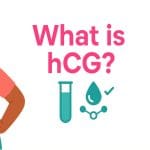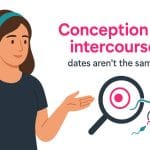Age changes natural conception odds and timelines. You can use the Fertility Calculator by Age to see a per cycle estimate, then come back to this guide to understand what drives those numbers and what to do next.
Below is a simple age based model, plus an overview of how fertility tends to change across the 20s, 30s and 40s, and when it makes sense to ask for more help.
Related tools
These tools are there if you like working with numbers. You can also just read the guide if you prefer a simple overview.
Quick Estimate: Pregnancy Chance Per Cycle
Enter your age to see a rough estimate for one menstrual cycle. For a more detailed model, use the Fertility Calculator by Age.
This simple model shows typical age trends only. To combine age with lifestyle, timing and contraceptive history, use the Advanced Pregnancy Chance Calculator.
How age impacts fertility
20s
- Peak fertility: Egg number and egg quality are generally highest and cycles are usually regular.
- Still important: Sleep, nutrition and timing still affect the chance of pregnancy in each cycle.
30 to 34
- Gradual decline: The number of high quality eggs starts to fall, but conception is still common.
- Strategy: Track ovulation, and address modifiable factors such as weight, smoking and alcohol where possible.
35 to 39
- Noticeable drop: Egg quality declines more quickly and miscarriage risk rises with age.
- Strategy: Aim for precise timing. Consider a preconception consult if you have been trying for more than 6 months.
40 and older
- Sharp reduction: The chance of pregnancy per cycle is lower and varies a lot from person to person.
- Strategy: Seek early specialist input. Discuss options such as IUI, IVF or donor eggs, and optimise general health.
Boost your chances at any age
- Time intercourse in the fertile window (you can use the Ovulation Calculator if you want help with timing).
- Aim for a healthy weight, avoid smoking and keep alcohol intake moderate.
- Work with a clinician to manage conditions such as thyroid disease or PCOS.
- Seek a fertility evaluation after 12 months of trying if you are under 35, or after 6 months if you are 35 or older, or sooner with very irregular cycles or a known condition.
- If you want a per encounter estimate, you can also use the One Time Pregnancy Calculator.
If you want a more detailed numerical estimate, the Advanced Pregnancy Chance Calculator combines age with timing, lifestyle and other factors.
FAQs
Does male age matter too?
Can lifestyle changes offset age?
When should I see a specialist?
Educational content only; not medical advice. Always consult a qualified clinician for personal guidance.
Last reviewed:


